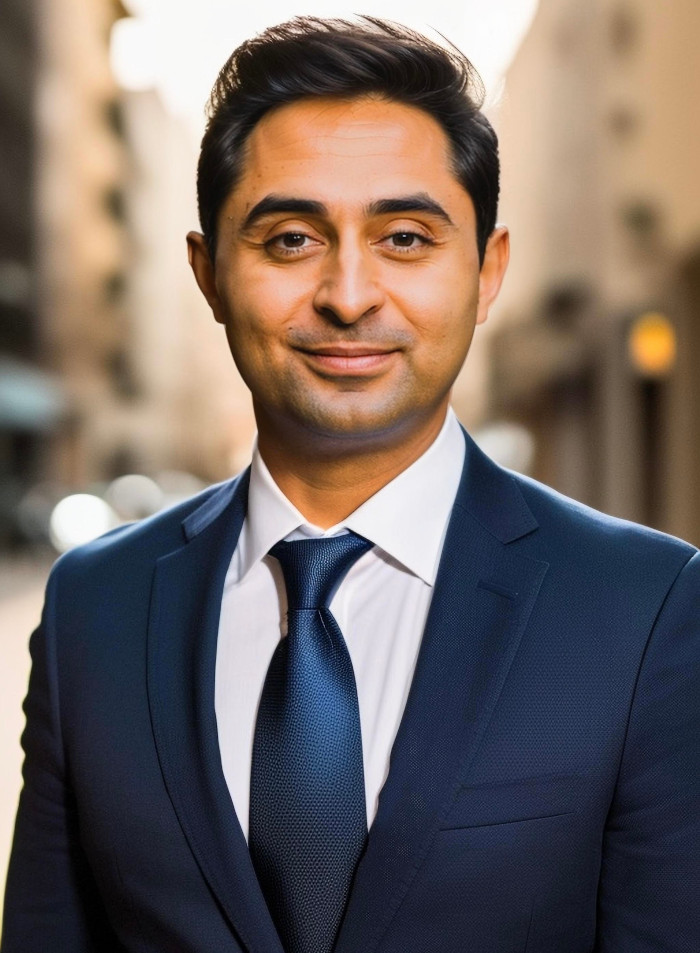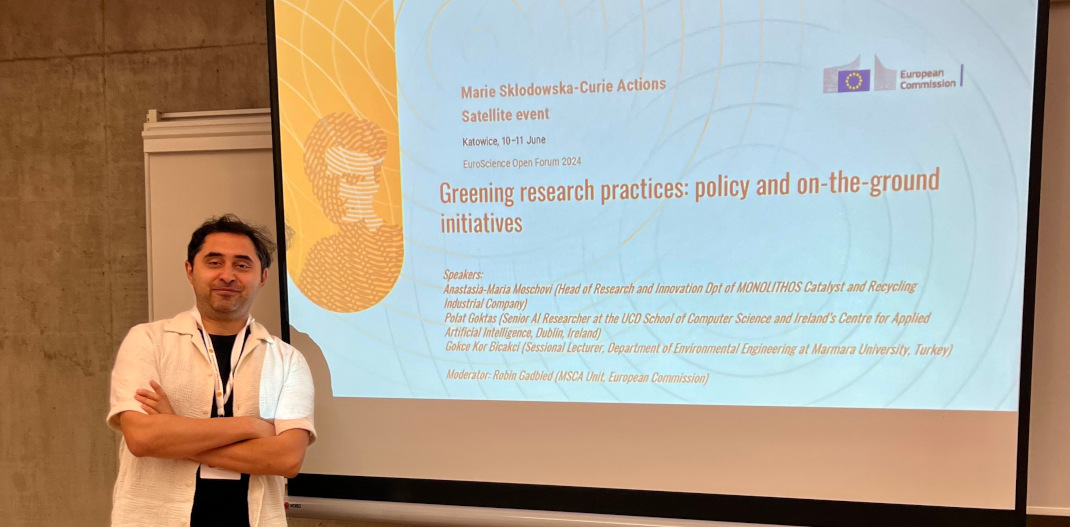Special Issue - Innovative and sustainable research practices: a panelist’s perspective
Newsletter
Thrilled to share my experience as a panelist at the Marie Skłodowska-Curie Actions Satellite Event in Katowice, Poland! Discussing sustainable research practices, I highlighted case studies on air quality analysis and AI-powered cellular studies, demonstrating how scientific innovation can align with environmental principles to foster a sustainable future in research.
Bionote
Polat Goktas is a Senior AI Researcher at University College Dublin, focusing on AI models for healthcare, life sciences, and sustainability. He actively contributes to the MCAA, promoting a sustainable research culture as an Editorial Board Member and Secretary of MCAA Ireland Chapter. Additionally, he is involved in the MCAA Sustainability General Interest Group and IEEE Young Professionals Climate and Sustainability Task Force, integrating sustainability into scientific inquiry.

Greening research practices: policy and on-the-ground initiatives
The Marie Skłodowska-Curie Actions (MSCA) Satellite event is a fantastic platform that fosters exchanges between researchers, MSCA alumni, and other professionals. It precedes the EuroScience Open Forum (ESOF)’s biannual conference and exhibition, enriching professional and intellectual dialogues.
Participating as a panelist at the MSCA Satellite Event, organized by the European Commission on June 10-11, 2024, in Katowice, Poland, was an immense honor. I had the privilege of speaking alongside esteemed colleagues Gokce Kor Bicakci from Marmara University and Anastasia Moschovi from Monolithos Catalysts & Recycling Ltd. The session, “Greening Research Practices: Policy and On-the-Ground Initiatives,” was moderated by Robin Gadbled, Policy Officer, European Commission.

Session highlights
The session began with an introduction by Robin Gadbled, who set the policy scene on sustainability in MSCA, especially under the MSCA Green Charter. His insights provided a comprehensive overview of the policies driving sustainability initiatives within the MSCA framework.
Anastasia Moschovi from Monolithos Catalysts & Recycling Ltd., Greece, highlighted practical applications of sustainability in the field of recycling and catalyst development. Her work demonstrated the feasibility and benefits of incorporating green practices into industrial processes.
Gokce Kor Bicakci from Marmara University, Turkey, emphasized the importance of integrating sustainable practices into research methodologies. Her presentation showcased innovative approaches to reducing environmental impact in academic research.
Innovative and sustainable research practices: real-world case studies
During my talk, titled “Innovative and Sustainable Research Practices: Case Studies in Data-Driven Air Quality Analysis and AIPowered Cellular Studies,” I presented two significant projects that I developed as part of my MSCA Career-FIT PLUS fellowship.
Air quality study in Ho Chi Minh City, Vietnam
This project utilizes an explainable data-driven approach to understand the impact of various air pollutants. By prioritizing digital tools and methodologies, we minimize physical resource use (Goktas et al., 2024). Employing high-performance computing facilities further reduces the need for physical infrastructure, decreasing the direct & indirect carbon footprint.
DeepStain: revolutionizing cellular analysis with AI
DeepStain integrates AI with bright-field imaging, eliminating the need for chemical staining in cellular analysis (Goktas & Carbajo, 2023; 2024). This significantly reduces hazardous waste and enhances the efficiency of stem cell production, reducing both energy consumption and resource waste. AI-powered non-invasive imaging techniques reduce the ecological footprint by eliminating the need for chemical dyes.
These case studies underline the potential of integrating innovative technologies with sustainable practices, providing tangible examples of how scientific research can advance without compromising environmental integrity.
Workshop and collaborative efforts
After the presentations, we engaged in a workshop divided into four groups, each tackling different aspects of greening research practices. I led Group 2, which focused on the knowledge and tools needed to evaluate our environmental footprint. We discussed tools like life cycle assessment indicators and transparent policy information. These discussions highlighted the necessity for accessible data and practical tools to enhance sustainability in research.
Engaging discussions and future directions
The interactive workshop provided participants with the opportunity to explore specific areas of interest. Group discussions focused on identifying key players in promoting sustainability, evaluating environmental footprints, securing financial resources for sustainable projects, and navigating existing laws and regulations.
As leader of Group 2, I facilitated a discussion on the tools needed to evaluate environmental footprints. We explored various environmental measurement tools, life cycle assessment indicators from the United Nations and European Commission, and the importance of transparency in policy and regulation. The group emphasized the need for accessible decision-making data and user-friendly tools to accurately assess carbon footprints.
Concluding thoughts
The MSCA Satellite Event was an enriching experience that underscored the importance of sustainable practices in research. The exchange of ideas and collaborative spirit among participants highlighted the collective commitment to advancing sustainability in academia and beyond.
By integrating innovative and sustainable practices, researchers can significantly reduce their environmental impact while continuing to push the boundaries of scientific discovery. The discussions and insights gained from this event will undoubtedly contribute to ongoing efforts to promote environmental stewardship in research practices.
Polat Goktas
Senior AI Research Scientist
University College Dublin
polat.goktas@ucd.ie
@PolatGoktass
References:
Goktas, P., Rakholia, R., Carbajo, R.S. (2024). Answering key questions about air pollution dynamics in Ho Chi Minh City: A spatiotemporal analysis using the XAI-SHAP clustering approach. Artificial Intelligence for Knowledge Management, Energy and Sustainability, IFIP Advances in Information and Communication Technology, 693.
Goktas, P., & Carbajo, R. S. (2023). PPSW–SHAP: Towards interpretable cell classification using tree-based SHAP image decomposition and restoration for high-throughput bright-field imaging. Cells, 12(10), 1384.
Goktas, P., & Carbajo, R. S. (2024). Advancing in vitro virtual nuclei staining of stem cells through a cross-structure, artifact-free U-Net approach. In SPIE Medical Imaging 2024: Digital and Computational Pathology, 12933, 84-91.